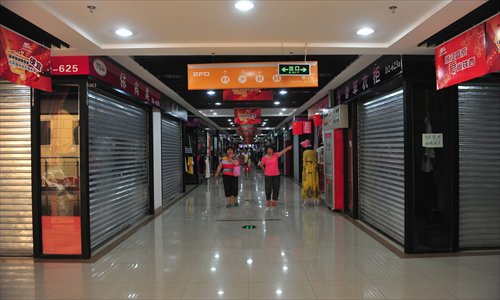Paralyzed by fear

After a week in which small businesses across Shenyang, Liaoning Province closed their doors after hearing rumors that government inspectors were looking to fill city coffers, most of them have resumed operation.
The Shenyang government has been attempting to quash the rumors ever since businesses started closing their doors in late July. By Monday and Tuesday, the streets were empty as shopkeepers feared they would be subject to harsh inspections and hefty fines. A quick scan of the streets and discussions with local residents revealed that almost all of the shops throughout Shenyang's city center had previously been closed, but now about 80 percent had reopened.
Cui Jixiang, an official with the publicity department of the Shenyang Committee of the Communist Party of China, told the Global Times they have been looking into the case trying to find out the source of the rumors, though he did not elaborate on the measures being taken.
The government response
The government denied carrying out an anti-counterfeit goods campaign in the lead up to the National Games, which are to be held in the city next year. The government insisted that the inspections were just routine tasks.
"There is no extensive law enforcement operation being conducted by the government, nor is there any plan to impose significant fines," said the city government on Tuesday via a Sina Weibo post.
The government will continue to protect the legal rights of shop owners and maintain commercial order, and residents are welcome to make a report through an official hotline if they have received hefty fines or have witnessed violence during government inspections or any other breach of regulations, according to the statement.
No small businesses were left entirely unaffected. Small shops including restaurants, barber shops, clothing stores and auto repair outlets were closed while residents complained about inconveniences. Local media appeared to be silent as the Shenyang government became the target of criticism.
"We had been closed since Monday, when we heard about the inspections, and reopened today, when we heard it was safe," said a food vendor on Thursday in Shenyang's Wu'ai Market, a commercial area that includes thousands of department stores and small shops selling clothing, textiles, electronics and construction materials.
"The producers of fake commodities are those that should be targeted in the crackdown, not us, since most of the time we didn't know we were selling sub-standard or fake goods," said a liquor shop owner who closed his store in Shenhe district for two days to avoid inspections.
"This time it was different in terms of the severity of the punishments," he said.
Everyone was talking about the inspections, including brand-name stores, said residents, for fear that inspectors might find fault with them even though they had all the required certificates.
Rumors out of control
Toothpick sellers were to be fined for not having tree-cutting certification and food vendors on the streets were to be fined for not wearing masks, according to some shop owners. And online posts claimed many owners were taken away by police after fines.
But it was difficult to verify the rumors as most people said they did not witness the inspections. Some Web users called on people who were fined to speak out, but failed to gather any evidence even if they offered a cash reward. Two urban administration officers patrolling around the Wu'ai Market on Thursday told the Global Times that they used to conduct regular inspections, but they did not see inspectors punishing owners while the rumors were spreading.
A restaurant in Shenhe district, which a Weibo post claimed had been fined 350,000 yuan ($55,037) for not having cutting certification for their bamboo rolling pin, told the Global Times the stories were all fake and they had closed their doors before the inspections.
Some shop owners told the Global Times that a Muslim restaurant was fined for not being a Muslim association member even though it had all the certificates that were required by officials.
"We did have some problems when inspectors came to check," said an employee with the Muslim restaurant, surnamed Su. Su refused to comment on the online rumors and did not specify how the restaurant was punished or for what reason.
Web users and some locals said the counterfeit goods crackdown was conducted to collect money for the preparation of the 12th National Games next year. Others said the government needed money to build more subways so they collected money in the name of a crackdown on counterfeit goods.
Neither claim could be confirmed.
Credibility crisis
Such a massive shutdown of the city economy, simply due to the spread of rumors, reflects a credibility crisis being faced by the authorities, analysts say, adding that the government should respond to rumors in a sincere, transparent and timely fashion.
Zhuang Tingwei, a provincial political advisor, submitted a proposal to the city government on Monday urging it to clarify the facts and stop rumors from spreading.
"It's horrible how powerful rumors can be. I don't think online claims about hefty fines are true, but some officials might have abused their powers and charged fines from shops without adequate reason. Those incidents might have fed into these rumors, leading to the paralysis of Shenyang," he told the Global Times.
Yu Guominng, director of the Public Opinion Research Institute with the Renmin University of China, said tighter self-regulation is needed among officials to boost their image and credibility.
"Rumors might be untrue, but the state of public sentiment is real. They're losing faith in some local officials," he said.
Previous cases of officials abusing their powers and taking money from the people in the name of law enforcement have contributed to the poor reputation of some local government agencies, said Zhu Lijia, professor with the Chinese Academy of Governance.